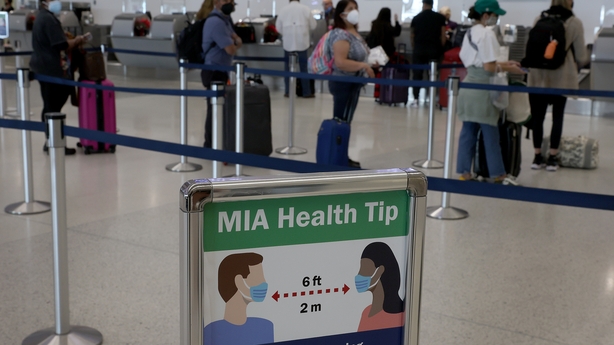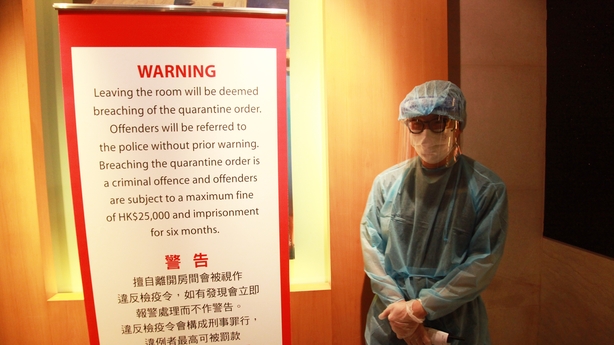A US federal judge has struck down the Covid-19 mask mandate for public transportation imposed by the administration of President Joe Biden, prompting major airlines to quickly drop the requirement.
US District Judge Kathryn Kimball Mizelle of the Middle District of Florida said the mask mandate exceeds the statutory authority of the Centers for Disease Control and Prevention (CDC).
The mandate requiring face masks on airplanes, subways, trains, buses, taxis and other forms of public transportation was recently extended by the CDC until 3 May amid a rise in coronavirus cases.
US airlines and a number of Republican lawmakers have called for an end to the mask mandate, which was issued by the CDC on 3 February 2021, shortly after Mr Biden took office.
In light of the decision, the Transportation Security Administration, which runs security at airports, will not enforce directives "requiring mask use on public transportation and transportation hubs at this time," an administration official said.
After the ruling was announced, United Airlines dropped its mask mandate on domestic flights and some international flights, depending on the rules in the country of arrival.
It was soon followed by American Airlines, Delta Airlines and Alaska Airlines, who all made masks optional for crew members and customers on domestic and most international flights.
United Airlines said: "While this means that our employees are no longer required to wear a mask - and no longer have to enforce a mask requirement for most of the flying public - they will be able to wear masks if they choose to do so, as the CDC continues to strongly recommend wearing a mask on public transit."
Like United, the other airlines also cautioned that travelers would still be subject to local mask regulations at their destinations.

Alaska also noted that the mask rule reversal, however, did not undo some decisions made while the measure was still in place.
Certain customers who were banned for not following the mask directive will remain barred, the airline said in a statement.
"We will have some guests whose behavior was particularly egregious who will remain banned, even after the mask policy is rescinded," it said.
Judge Mizelle, a nominee of former president Donald Trump, issued her ruling in a lawsuit filed in July 2021 by a conservative non-profit organization called the Health Freedom Defense Fund and two individual plaintiffs.
Although the public has a "strong interest" in combating the spread of Covid, the judge said, the mask mandate "exceeded the CDC's statutory authority," and it "failed to adequately explain its decisions."
"Because our system does not permit agencies to act unlawfully even in pursuit of desirable ends, the Court declares unlawful and vacates the Mask Mandate," Judge Mizelle said in a 59-page ruling.
White House Press Secretary Jen Psaki called the ruling a "disappointing decision."
"The CDC continues recommending wearing a mask in public transit," Psaki said.
There was no immediate comment from the Justice Department, which could potentially appeal the ruling.
Hong Kong zero-Covid policies create mountains of plastic waste
Hong Kong arrivals meet plastic everywhere in quarantine hotels: Remote controls are wrapped in cellophane, pillows are encased in plastic bags, food comes with plastic cutlery.
Hong Kong's strict quarantine policies - intended to halt Covid-19 at the border and in the community - have been criticised for damaging the economy and mental health.
Environmentalists say the policies are also hurting the environment by generating excess waste.
"Every single one of the staff members here wears full PPE... the gowns, the gloves, the booties, the hats, and that's every staff member and on every floor," said Hong Kong-based skincare entrepreneur Clementine Vaughan, who flew into the city on 4 April.
"The phones, you know, the remote controllers, everything's been cellophane-wrapped," she said, speaking to Reuters from her quarantine hotel.

Hong Kong disposes of over 2,300 tonnes of plastic waste a day, and with a recycling rate of just 11%, according to government figures, most of it goes into landfills.
A government spokesperson said officials were aware of a surge in disposable waste since Covid began, urging people to adopt a green lifestyle as far as possible.
Edwin Lau, with local environmental group The Green Earth, said Hong Kong’s approach to Covid reflected its lack of environmental awareness.
"People living in quarantine hotels, they are not confirmed cases," Mr Lau said, urging the government to allow the recycling or reuse of plastics from quarantine facilities.
Hong Kong, one of the few places that holds to a zero-Covid policy, has quarantined tens of thousands of people this year infacilities for the Covid-positive and near contacts.
The facilities add to the waste problem, with residents saying that all meals came in plastic bags.
Paul Zimmerman, an elected district councillor, said the facilities are also wasteful because they cannot be used long-term, such as for public housing.
"They've been built very quickly ... (and don't) comply with any particular building standards we have in Hong Kong."

